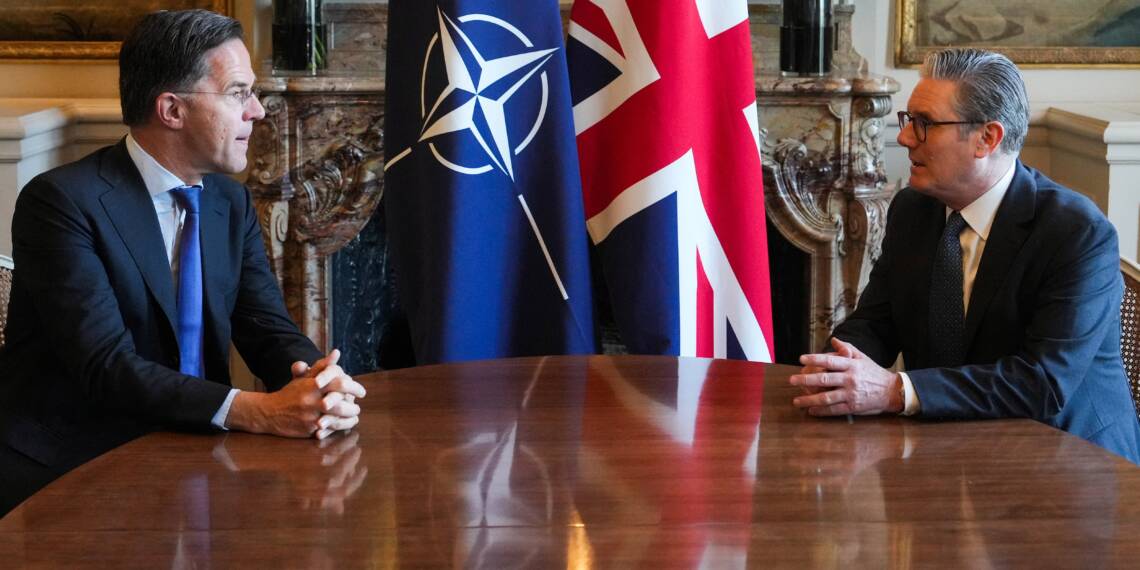In a stark warning delivered at Chatham House in London on June 9, 2025, NATO Secretary-General Mark Rutte urged the United Kingdom to significantly increase its defense spending to counter the growing threat posed by Russia’s advanced missile capabilities. Rutte cautioned that without substantial investment in military defenses, British citizens might need to “learn to speak Russian,” highlighting the urgency of preparing for potential Russian aggression within the next five years.
Last week, Starmer unveiled his cabinet’s Strategic Defense Review, promising to invest billions more in weapons factories, drones, and submarines to make Britain “a battle-ready, armor-clad nation with the strongest alliances and the most advanced capabilities.” London’s policy will “always be NATO first,” he said. However, the prime minister declined to set a deadline for the UK to reach its goal of increasing defense spending to 3% of GDP.
Speaking at Chatham House in London on Monday, Rutte said he was “really impressed” by Starmer’s plans.
Asked if the UK should increase taxes even further in order to fund the rearmament program, he replied: “it is not up to me.”
“I mean, what I know is that if we want to keep our societies safe… look, if you do not do this, if you would not go to the 5%, including the 3.5% core defense spending, you could still have the National Health Service, or in other countries their health systems, the pension system, etc., but you had better learn to speak Russian,” he said.
Rutte reiterated his claim that Russia could be ready to target NATO countries within the next five years.
“The new generation of Russian missiles travel at many times the speed of sound. The distance between European capitals is only a matter of minutes. There is no longer east or west. There is just NATO,” he said.
Rutte emphasized the speed and lethality of Russia’s new generation of hypersonic missiles, which he claimed can travel at many times the speed of sound, reducing the distance between European capitals to “a matter of minutes.” To address this threat, Rutte called for a 400% increase in NATO’s air and missile defense systems, alongside the acquisition of thousands more armored vehicles and millions of artillery shells to match Russia’s current production levels.
Speaking after a meeting with UK Prime Minister Keir Starmer, Rutte praised the UK’s recent Strategic Defense Review, which outlines plans to bolster defense capabilities through investments in weapons factories, drones, and submarines. Starmer has committed to increasing defense spending from the current 2.33% of GDP to 2.5% by 2027 and 3% by the early 2030s.
Rutte’s remarks come amid heightened concerns about Russia’s military intentions, particularly following its full-scale invasion of Ukraine in February 2022. He warned that Russia could be ready to use force against NATO within five years, a threat he believes will persist even if the war in Ukraine ends. Moscow, however, has dismissed these claims as fearmongering, with Kremlin spokesperson Dmitry Peskov calling the perceived threat “ephemeral” and arguing that European taxpayers will bear the cost of inflated defense budgets.
The NATO chief’s call for increased spending aligns with pressures from U.S. President Donald Trump, who has long criticized European allies for relying too heavily on American security support. Rutte acknowledged that “America has carried too much of the burden for too long,” echoing Trump’s push for NATO members to meet a 5% GDP defense spending target. This has prompted European nations, including the UK, to reassess their military strategies and reduce dependence on U.S. support, especially as Trump’s administration signals a shift in focus toward Asia and U.S. border security.
Rutte’s speech also highlighted broader global security concerns, including China’s rapid military buildup and its support for Russia’s war efforts. He stressed the interconnected nature of threats across the Euro-Atlantic and Indo-Pacific regions, urging NATO to adopt a “military mindset” to stay ahead of adversaries like Russia and China.
As the NATO summit approaches, Rutte’s warnings underscore the alliance’s push for a “quantum leap” in collective defense to deter an increasingly militarized Russia. Moscow has consistently maintained that it has no intention of delving into NATO territory and has instead asked for a status quo where NATO also does not expand, this however has not been accepted by the NATO alliance which continues to push near the Russian borders prompting a response from Russia. These developments will now only lead to a more militarized Europe with Russia now fixing its focus on regions farther from Ukraine especially on France, Germany and the UK.








